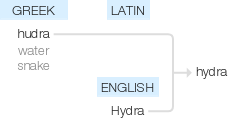Hydra
via Latin from Greek hudra ‘water snake’ (see Hydra), named by Linnaeus because, if cut into pieces, each section can grow into a whole animal.
wiktionary
After the Hydra, from Greek mythology, which grew two new heads every time one of its heads was cut off. The first sense alludes to the budding method of asexual reproduction that the hydra practices, similar to growing new heads. The second sense refers to how the creature could not be killed by a swift, decisive solution (in contrast to a Gordian knot).
etymonline
hydra (n.)
name of the many-headed Lernaean water serpent slain by Herakles in Greek mythology, late 14c., idre, from Greek Hydra, fem. of hydros "water-snake," from hydor "water" (from suffixed form of PIE root *wed- (1) "water; wet").
The word is etymologically related to Sanskrit udrah "aquatic animal" and Old English ottur (see otter). Used figuratively for "any multiplicity of evils" [Johnson]. The fabulous beast's heads were said to grown back double when cut off. As a constellation (see Hydrus), usually identified as the monster Herakles slew, from mid-15c. As the genus name of a freshwater polyp from 1798; said to have been so called by Linnaeus for its regenerative capabilities.
